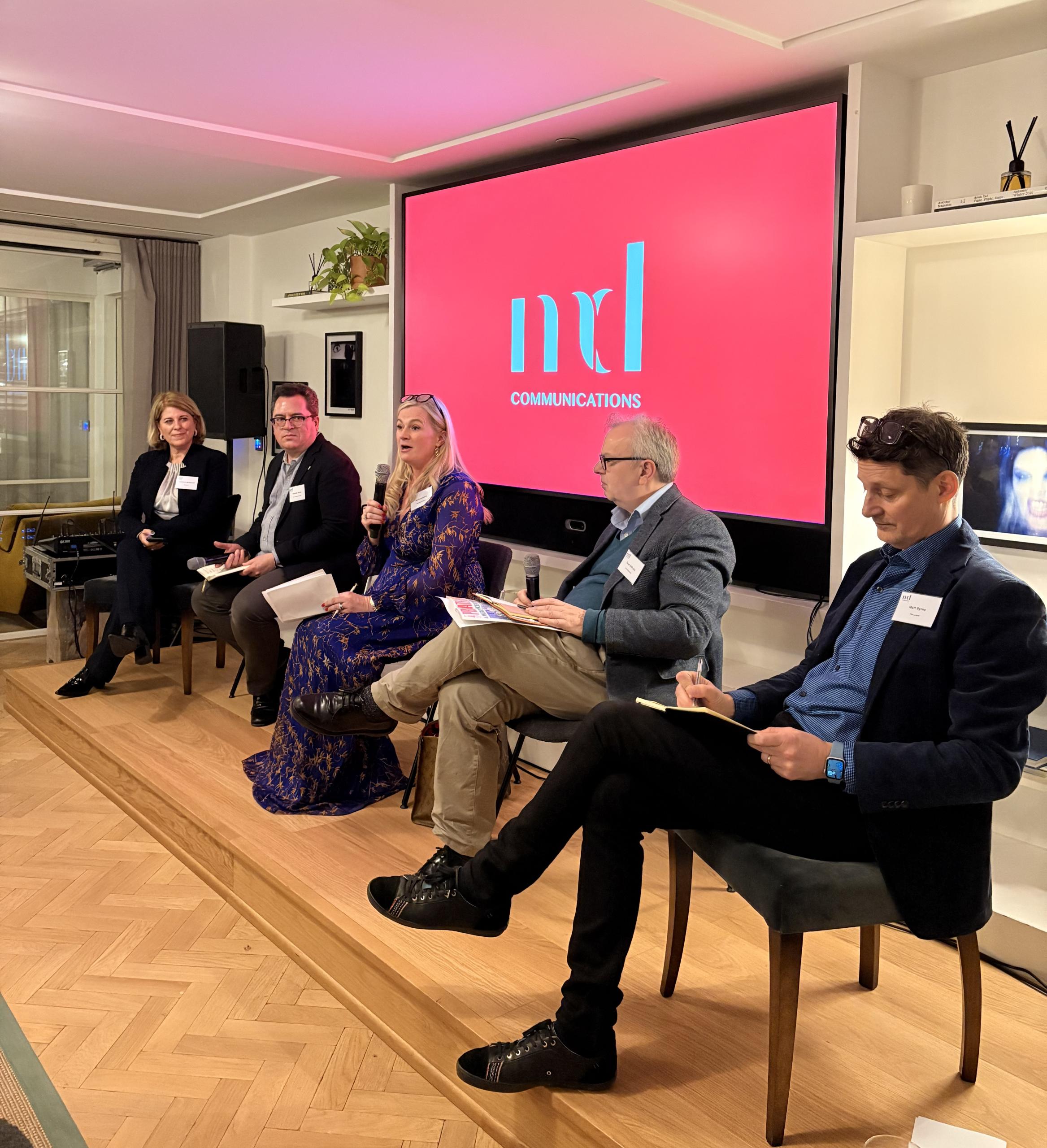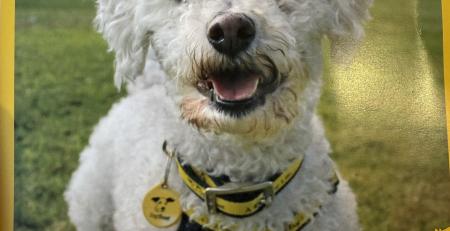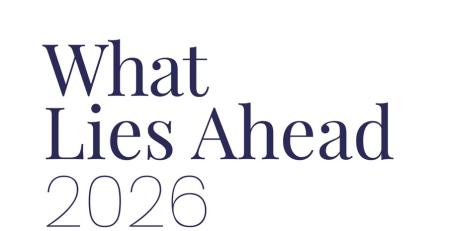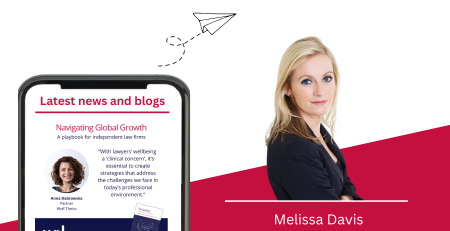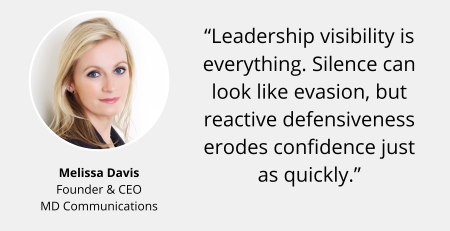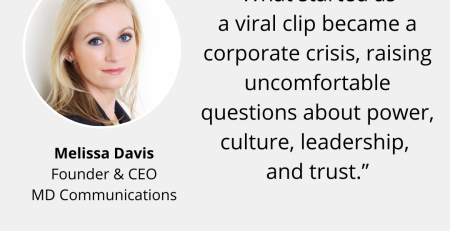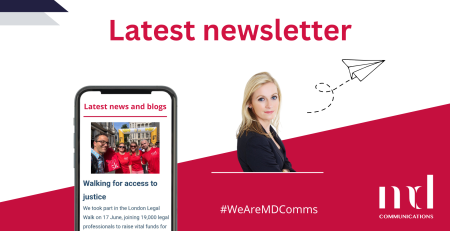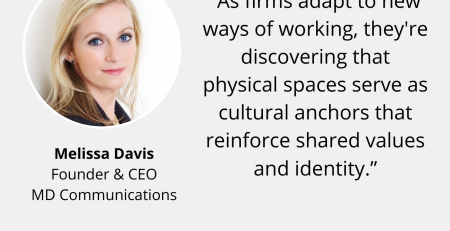Our Meet the Media event, chaired by our CEO Melissa Davis, explored crisis in the legal sector with rich insights from the panel of four leading journalists.
On a chilly January evening, four journalists gathered at Soho House’s 180 Strand to discuss crisis communications before a hand-selected audience. The panel, chaired by MD Communications CEO Melissa Davis, included Eduardo Reyes (The Law Society Gazette), Matt Byrne (The Lawyer), Victoria Macdonald (Channel 4), and Sean O’Grady (The Independent).
Understanding crisis response
The panel opened by sharing notable crises they had covered, including the Post Office scandal, Covid mismanagement, partygate, and the MeToo movement. A recurring theme was that organisations often react by going into defensive mode, believing they can ‘win’ by protecting individuals involved. However, history suggests otherwise – leaders like the Archbishop of Canterbury and Prince Andrew ultimately had to step away. Organisations must ask: How will this end? Is it survivable? The answer is often no.
Defensiveness can backfire, as seen with Boris Johnson’s dismissive attitude toward Covid victims. Instead, showing empathy and transparency is key. Matt Byrne, who has covered numerous law firm crises, stressed that dismissing a journalist with “there’s no story here” only invites deeper scrutiny.
Victoria Macdonald contrasted politicians’ and scientists’ crisis responses during Covid. While Boris Johnson made reckless statements, Jonathan Van-Tam remained reassuring and credible, despite both having access to the same communications training. The takeaway? Arrogance and ignoring expert advice can be disastrous.
Eduardo Reyes highlighted a positive example from the Enron collapse – an MP from Garratts personally found jobs for affected staff, showing how leadership in crisis matters. He also noted that organisations that fail to care for their people tend to experience more damaging leaks.
Crisis management: key takeaways
- How can you help a client when no one takes responsibility?
The panel emphasised the importance of having a designated spokesperson, typically the Head of Comms or Managing Partner.
Establishing a proactive media relationship is crucial. If an organisation only engages with the press during crises, its online presence will be dominated by negative coverage. As one panelist bluntly put it: “We’re not your friends.”
Understanding media dynamics is also vital – regulated outlets like Channel 4 and the BBC report differently from tabloids, which thrive on sensationalism.
- Balancing confidentiality and transparency
Public interest often outweighs client confidentiality, particularly regarding NDAs, SLAPP lawsuits, and corporate malpractice. A critical distinction must be made between public interest and what interests the public – they are not the same.
- Have firms improved post-MeToo, or are they just better at hiding issues?
Larger firms can conceal misconduct more effectively, but cultural shifts have made a real impact. There’s greater awareness, stronger employment protections, and heavier sanctions for firms tolerating bad behaviour. Increased female representation in leadership has also encouraged accountability.
While some argued that high salaries could lead to a sense of entitlement and worse behaviour, most disagreed, citing improved industry standards.
- Managing misinformation in journalism
The panel agreed that while misinformation is easy for trained journalists to detect, the general public often struggles. The rise of social media has made traditional media more conscientious by comparison.
The lack of online regulation is a major issue. The Leveson Inquiry shut down News of the World but failed to impose rules on digital misinformation, a gap that remains today.
Despite its drawbacks, social media, particularly X (formerly Twitter), is invaluable for journalists. Research that once required hours in newspaper archives is now available instantly.
Final tips from the panel
- Journalists aren’t your friends – don’t try to control the narrative.
- Understand the Streisand effect – attempting to hide minor infractions can amplify them.
- Build relationships with the press early – share positive news like awards, charity work, and pro bono initiatives. Otherwise, the only media coverage you’ll have will be crisis-related.
- Spokespersons should avoid sounding over-rehearsed – journalists can detect inauthenticity.
- Never say “no comment” – it always looks bad.
Looking ahead
As the media landscape evolves, organisations must adapt their crisis strategies. Transparency, empathy, and preparation remain the cornerstones of effective crisis communications. Those who fail to engage with the media before a crisis hits may find themselves unprepared when one inevitably does.
The event offered valuable insights into handling reputational crises. The overarching message? Proactive media engagement and authentic communication are key to surviving the toughest challenges.


